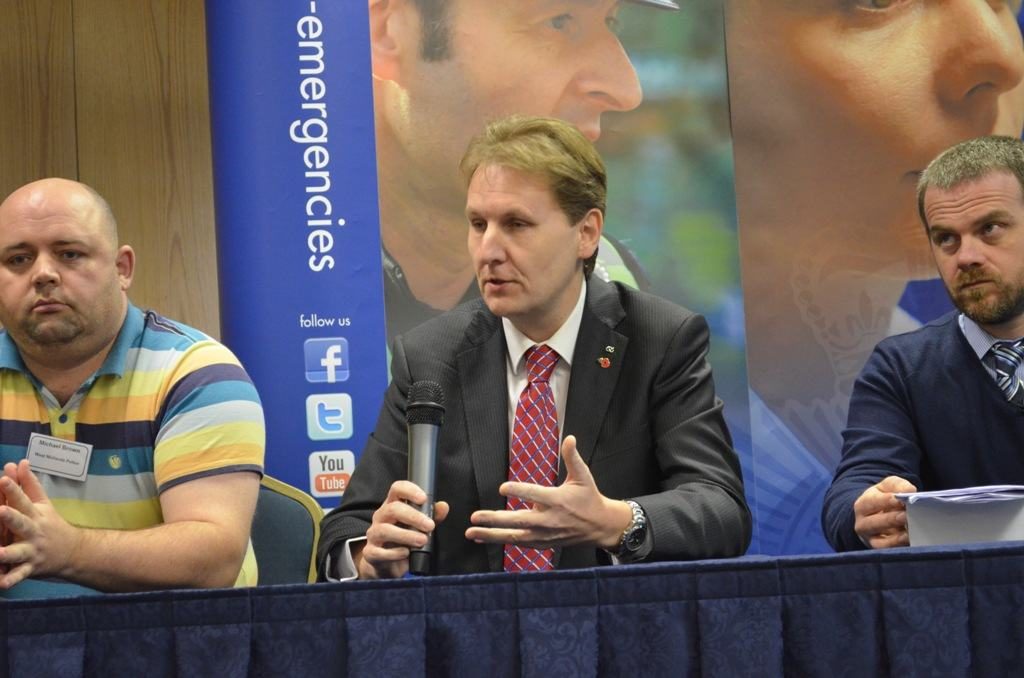 A conference this week has led to a call from Staffordshire’s PCC for a ‘fundamental overhaul’ in the way mental health services are provided across Staffordshire and Stoke-on-Trent.
A conference this week has led to a call from Staffordshire’s PCC for a ‘fundamental overhaul’ in the way mental health services are provided across Staffordshire and Stoke-on-Trent.
The event was attended by more than a hundred local practitioners, third sector bodies and senior police officers and was arranged by the Office of Staffordshire’s Police and Crime Commissioner, Matthew Ellis.
It follows a report commissioned by Mr Ellis in April which said that around 20% of total police time in Staffordshire and Stoke-on-Trent is spent dealing with mental health related incidents. The ‘Staffordshire Report’ also made clear that a lack of the right support for people suffering from mental illness is a key reason why individuals end up in police cells instead of more appropriate facilities. It highlighted too that some individuals end up in the Courts unnecessarily when they are ill, not criminals.
The report was recently used by Home Secretary Theresa May to illustrate the scale of the problem nationally. It showed that police attended 15,000 incidents involving mental illness in Staffordshire and Stoke-on-Trent during 2012. In the year up to last April 169 people with a mental health condition were held in police cells rather than more appropriate facilities because none were available and a total of 659 individuals were Sectioned under the Mental Health Act and detained by police.
Mr Ellis said,
“Staffordshire is not unique and the difficulties experienced here are replicated in other parts of the country. The conference proved invaluable in helping to understand why. The lack of mental health ‘places of safety’ mean police cells are often used and the inadequacy of 24/7 mental health crisis services are a big part of the problem for Staffordshire and Stoke-on-Trent.
“But those issues are just symptomatic of a system across Staffordshire and Stoke-on-Trent that needs an urgent rethink and overhaul. Current arrangements are failing individuals who need support rather than being criminalising and it is costing more than needed because of inadvertent cost shunting from one public agency to another. Addressing the fundamental problems with the system as it is now could free up more resource to widen the support available for people and deal with issues earlier and more effectively for the individuals and for tax payers.
“Having opened the conference, listened to mental health professionals who spoke and then talked informally to many of them, I was left with a feeling of frustration and anger but also some optimism.
“Front line professionals are trying hard to make a system work on the ground that is obviously flawed at the highest design level locally. Funding for mental health sits with numerous different agencies including local authorities, different parts of the NHS and local GP groups. This is a challenge which is not being addressed as it needs to be.
“There is a lack of join up in services geographically across Staffordshire and Stoke-on-Trent but also in the way that services are commissioned by the different funding bodies. My plea is to join up ways of working and to use the funding available as a more integrated sector rather than in silos. This resulted in half a dozen practitioners telling me how substantial improvements could be made in important parts of mental health services if there was a will and also greater ambition to do so from mental health bosses across the organisation.
“I also learned that the funding I’ve provided from my budgets to pilot a new approach for mental health triage in the north of Staffordshire is working just two weeks after it started. Simply doing the same thing more efficiently isn’t going to see us through the next few years. It’s about a monumental change which is needed in the way mental health services are provided by working intelligently and collaboratively across agencies and across administrative boundaries.
“The conference, I believe, focused minds and also demonstrated where the ambition for real change lies, or doesn’t, as the case may be. This is not just about freeing up police time, although that’s important, it’s about ensuring individuals don’t find themselves locked up in cells just because it’s the only perceived place of safety.
“On the back of this conference, senior decision makers from across mental health in Staffordshire and Stoke-on-Trent will be coming together in January. I hope it will help to understand the effect of the pilot work as well as be a chance to look for fundamental change which uses money more efficiently, and therefore goes further, and also ensures the system fits better the needs of individuals with mental health challenges wherever they are in Staffordshire.”



